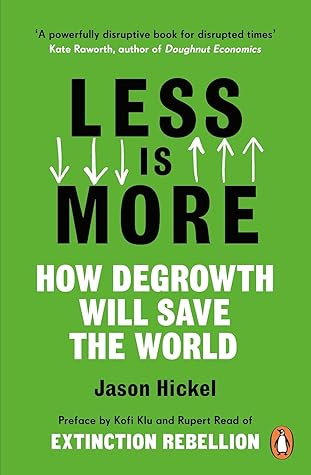More on this book
Community
Kindle Notes & Highlights
by
Jason Hickel
Read between
June 8 - December 8, 2024
reciprocity
totalitarian
oceans heat up, nutrient cycles are being disrupted, food chains broken, and vast stretches of marine habitat are dying off.15 At the same time, carbon emissions are causing oceans to become more acidic. This is a problem, because ocean acidification has driven mass extinction events a number of times in the past. It played a major role in the
marine ice-cliff instability.
ameliorate
Even though we have known for nearly half a century that human civilisation itself is at stake, there has been no progress in arresting ecological breakdown. None. It is an extraordinary paradox. Future generations will look back on us and marvel at how we could have known exactly what was going on, in excruciating detail, and yet failed to solve the problem.
When growth fails to stop – when cells keep replicating just for the sake of it – it’s because of a coding error, like what happens with cancer. This kind of growth quickly becomes deadly.
least 2% or 3% per year,
doubling the size of the global economy every twenty-three years,
Anthropocene
Even if this wasn’t a problem, we must ask ourselves: once we have 100% clean energy, what are we going to do with it? Unless we change how our economy works, we’ll keep doing exactly what we are doing with fossil fuels: we’ll use it to power continued extraction and production, at an ever-increasing rate, placing ever-increasing pressure on the living world, because that’s what capitalism requires.
Because in a growth-oriented economy, efficiency improvements that could help us reduce our impact are harnessed instead to advance the objectives of growth – to pull ever-larger swathes of nature into circuits of extraction and production. It’s not our technology that’s the problem. It’s growth.


